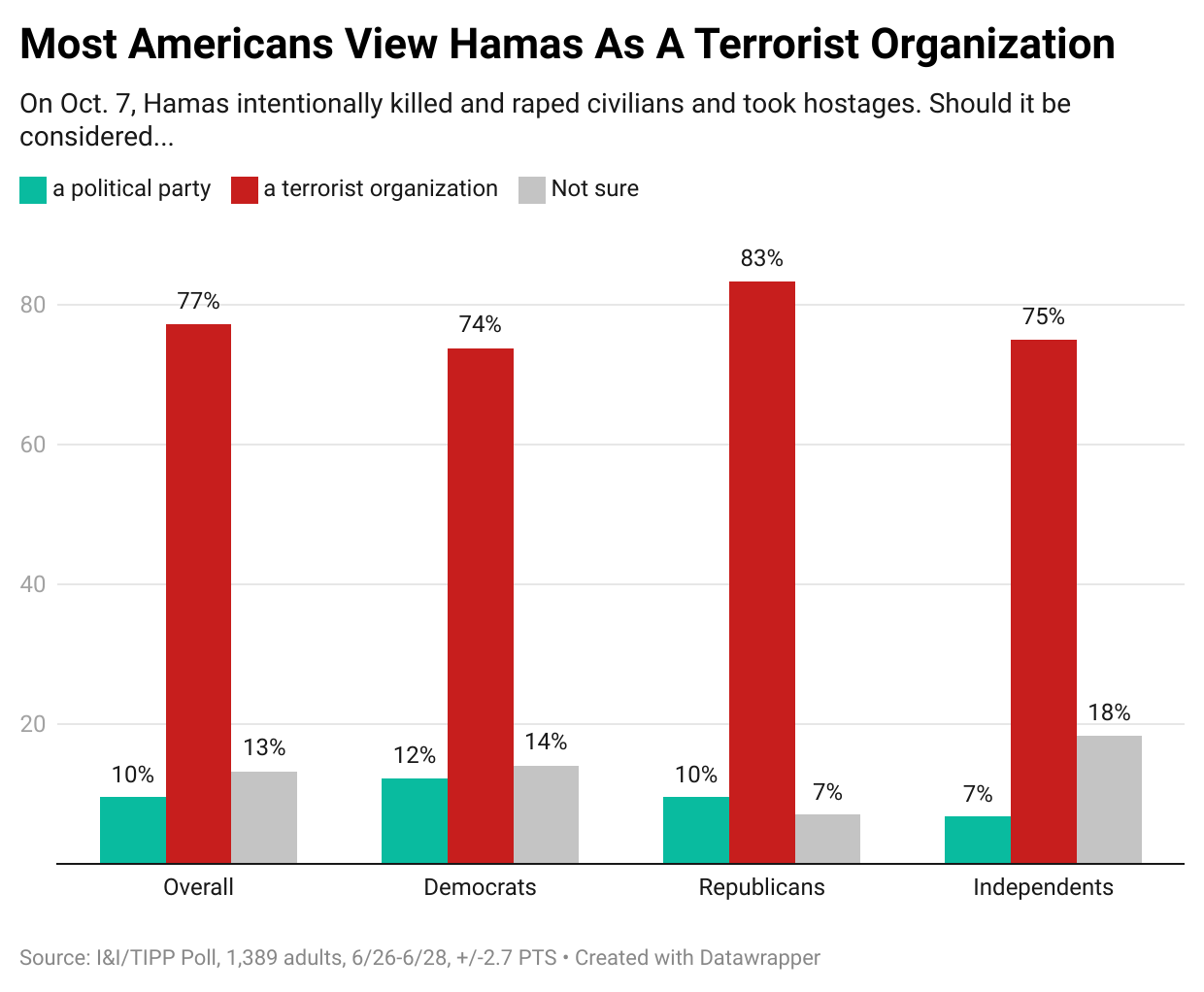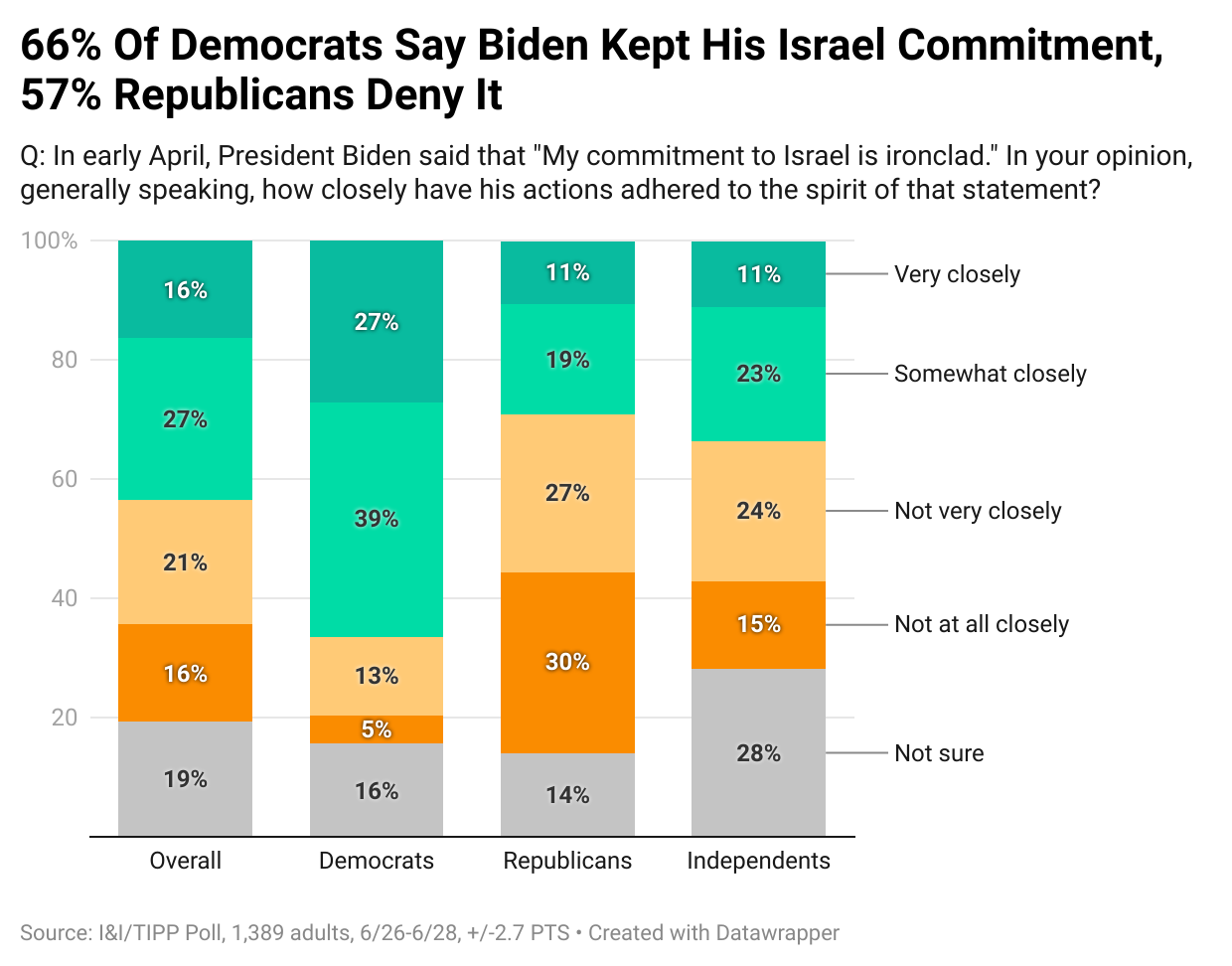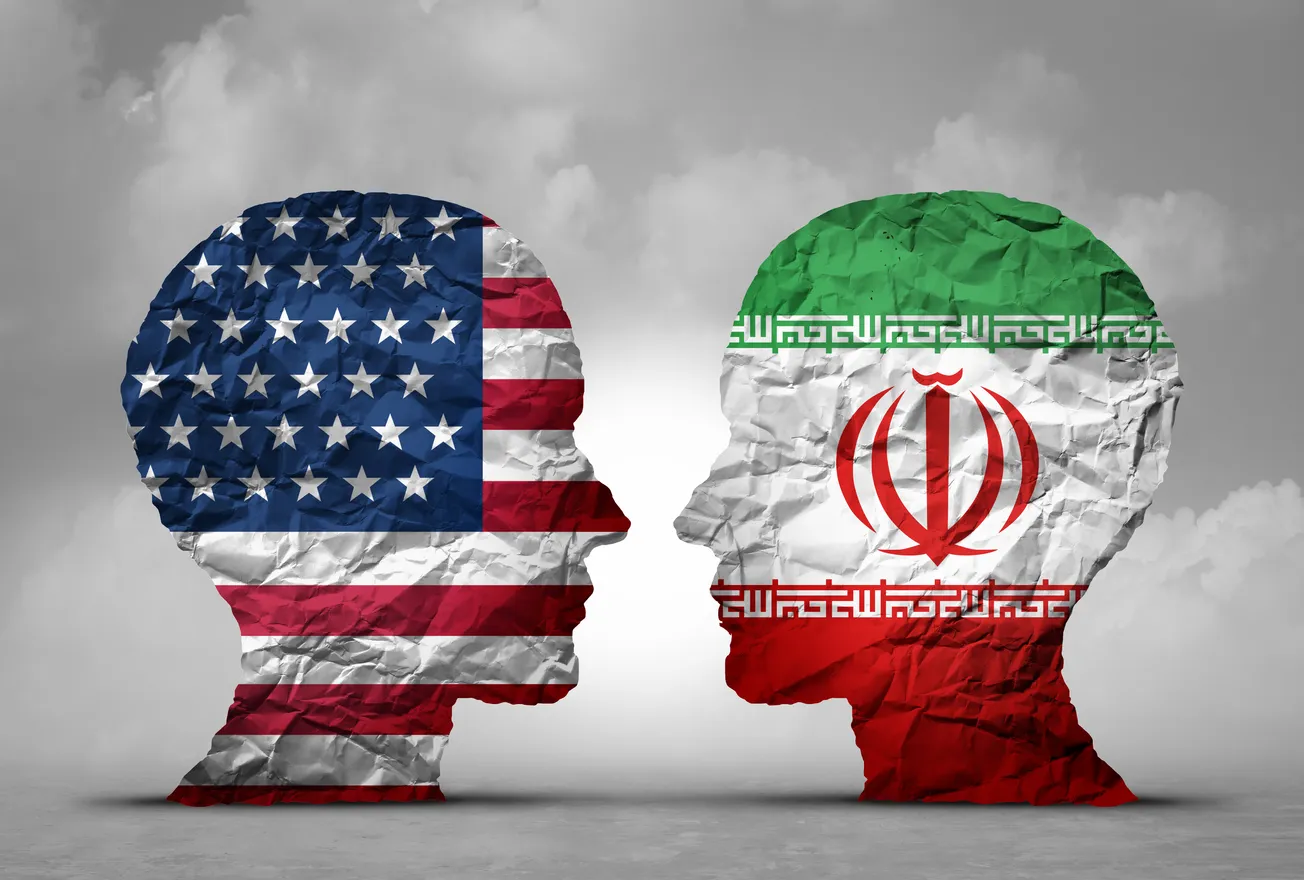Is Hamas a legitimate political party, or a terrorist organization? Much U.S. policy depends on the answer. American voters have a resounding response: By nearly eight to one, they say Hamas is a terrorist group, the latest I&I/TIPP Poll shows.
With the nation experiencing a surge in violent demonstrations supporting Hamas and coming after Prime Minister Benjamin Netanyahu's stirring July 24 speech before the U.S. Congress, the question regarding Hamas has taken on new urgency.
For this month's national online I&I/TIPP Poll, we asked the following question of 1,389 voters: "On Oct. 7, Hamas intentionally killed and raped civilians and took hostages. Should it be considered . . .", followed by three possible choices: 1.) a political party, 2.) a terrorist organization, and 3.) not sure.
The poll was taken from June 26-28, and so didn't capture voters' reactions to the latest wave of pro-Hamas demonstrations and violence.
Even so, the response was overwhelming: 77% called Hamas a "terrorist organization," while just 10% called it a political party and 13% said they were not sure. The poll has a margin of error of +/-2.7 percentage points.
There was a solid tri-partisan consensus: Just 12% of Democrats, 10% of Republicans and 7% of independents described Hamas as a "political party." Meanwhile, 74% of Democrats, 83% of Republicans and 75% of independents termed Hamas a "terrorist organization."

None of the 36 demographic groups I&I/TIPP regularly tracks was below 60% in describing Hamas as a terrorist group, an unusually strong consensus in a monthly poll that routinely shows big differences in responses, especially by political party.
One other big difference was age. 94% of those over 65 years of age agreed that Hamas is a terrorist organization, compared to 71% of those 18-24 years of age, 62% of those 25-44, and 82% of those 45-64.
Why the difference? One strong possibility is that those over 65 remember both the 1967 Six-Day War and the ensuing 1973 Yom Kippur War, both of which pitted tiny Israel against a broad coalition of hostile Arab and other nations.
Americans of that time were overwhelmingly supportive of Israel, backing it over the Palestinians (today's Hamas is part of the Palestinian movement) by 11-to-1 in the Six-Day War and by 7-to-1 in the Yom Kippur War.
The poll asked a second question, which came before President Joe Biden decided not to run for a second term and before Vice President Kamala Harris was chosen by Democratic Party insiders as the likely nominee.
The question: "In early April, President Biden said that 'My commitment to Israel is ironclad.' " In your opinion, generally speaking, how closely have his actions adhered to the spirit of that statement?" The possible responses provided included: "Very closely," "Somewhat closely," "Not very closely," and "Not at all closely."
Here, the responses were mixed, in particular by political party or affiliation.
Overall, a plurality of 43% said they agreed that Biden's actions toward Israel matched his rhetoric, while 37% said they didn't.
Look a little closer, and you see that, of the 43%, just 16% say his words and deeds match "very closely," while 27% say "somewhat" closely. As for the 37% "not closely" response, 21% said "not very closely" and 16% said "not at all" closely.
However, when broken down by political party, the picture changes somewhat.
Democrats overwhelmingly supported the idea that Biden's verbal promises and his actions toward Israel were in sync, 66% to 18%. That compares with 30% to 57% for the Republicans and 34% to 39% for independents.

So once again, the ideological divide helps determine how political groups view an issue. It will also provide a major foreign policy debating point for the two major parties during the remainder of the 2024 presidential election cycle.
For former President Donald Trump, an ardent supporter of Israel during his term in office, his policy would likely be little changed.
But, given Harris' tough stance on Israel and criticism of its response to the Oct. 7 terrorist attack by Hamas, she might have a tough-sell to the mass of voters who strongly back the small-but-powerful nation of just over 9 million people.
After her 40-minute meeting last week with Netanyahu, Harris was described as "visibly angry", saying "as I just told Prime Minister Netanyahu it is time to get this deal done. Let's get the deal done. So we can get a ceasefire to end the war."
Netanyahu, not surprisingly, "was upset by . . . Harris' on-camera statement after their meeting and is concerned it will harm the negotiations over a Gaza hostage and ceasefire deal, an Israeli official said in a briefing with reporters," according to Axios.
Israel's supporters here in the U.S. called her comment irresponsible, saying it could damage prospects for a lasting peace.
"Her words make it clear she believes the onus here is on Israel and Prime Minister Netanyahu to bring the war to an end," wrote John Podhoretz in the New York Post. "And she explicitly made it clear she is on the side of those who do not want Israel to secure victory: 'So to everyone who has been calling for a ceasefire, and to everyone who yearns for peace, I see you and I hear you.'"
Others add that Harris also seems OK with leaving Hamas in power in Gaza, which means Israel would have to live under a virtual permanent terrorist high-alert.
"It is clear what the implications of Harris’s position are," noted the Washington Examiner. "She says this can end “in a way where Israel is secure” while demanding that Israel allow the genocidal terrorist organization that massacred 1,200 Israeli and American civilians to remain in power."
Harris' tough-on-Israel views perhaps shouldn't be surprising.
Her main adviser, Philip Gordon, who also advised President Barack Obama, leans heavily toward support for Palestinians, and away from Israel. Indeed, his "hostility toward Israel and sympathy for Islamic terrorists is a longstanding matter," according to Front Page Magazine.
Will this concern Democratic voters who worry about Israel's continued existence? Will it further inflame the increasingly violent antisemitic movement in the U.S., which leans heavily toward the left side of the political spectrum?
Or will it recede in importance, as other election issues, including inflation, out-of-control crime and illegal immigration, continue to grab news headlines?
Whichever it is, the ongoing conflict between Israel and the Palestinians has no simple political solution. Americans have shown over the years that they value Israel as a political ally and beacon of real democracy in the Mideast. Nothing has changed.
As such, Harris' perceived anti-Israel stance may cost her badly needed votes down the stretch, as I&I/TIPP Poll's data indicate. And unlike Biden, she may have trouble proving to voters her support for Israel is "ironclad."
I&I/TIPP publishes timely, unique, and informative data each month on topics of public interest. TIPP’s reputation for polling excellence comes from being the most accurate pollster for the past five presidential elections.
Terry Jones is an editor of Issues & Insights. His four decades of journalism experience include serving as national issues editor, economics editor, and editorial page editor for Investor’s Business Daily.









